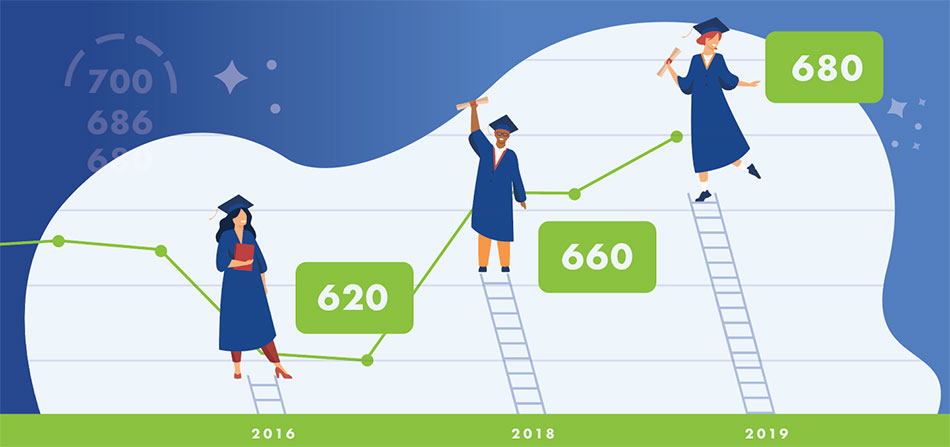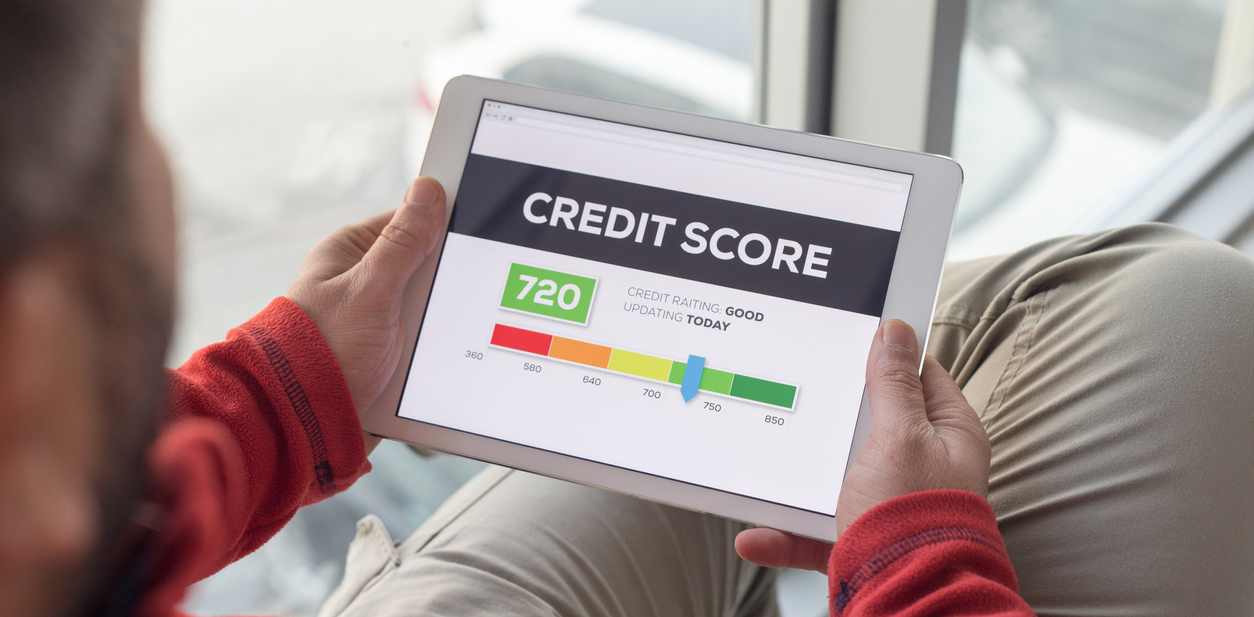Millions of students across the country are in a financial bind as a result of the global pandemic. But there’s one silver lining:
Our customer data shows that student credit scores are rising, along with savings from refinancing auto loans.
For well over a decade, U.S. students have benefited from government regulations that were designed to mitigate default risk.
The CARD Act of 2009 protects students from predatory credit card solicitation practices on college campuses (among other things). Similarly, student loan reform has introduced new repayment options, including debt forgiveness, and even more protections for borrowers.
We wanted to know: Have these regulations helped students’ credit scores? If so, does a higher credit score improve students’ chances of getting approved for credit — specifically auto loan refinancing?
We analyzed student customer data and found that amidst regulatory action, students have indeed improved their credit scores.
Key findings
- Student credit scores have risen from 2016 to 2019, while savings from refinancing auto loans have started to rise again over the past two years.
- Payoff balances are lowest for students compared to other refinance applicants.
- Of the students who successfully refinanced their auto loan, 80% had a joint applicant. However, only 15% of students submitted an application with a joint applicant.
We also found that students saved an average of $77 per month by refinancing their auto loans from 2013 to 2019, or $928 per year.
Student Credit Scores Are on the Rise
On average, students have experienced a 60-point increase in credit scores from 2016 to 2019. This boost comes after a short period of declining scores for students from 2014 to 2016.
Students vs. other employment types
Since 2016, student and unemployed applicants have seen the largest increase in credit scores, rising about 10% and 12% respectively.
Although retired applicants have the highest credit scores among our employment types, their credit scores have also experienced a dip, dropping 59 points between 2012 and 2016 before climbing 39 points from 2016 to 2019.
What’s Helping Students’ Credit Scores?
Credit is complicated. There are several factors that can impact a person’s credit score including payment history, account balances, credit history, types of credit, and credit inquiries.
Here are a few reasons why student credit scores may be increasing.
Low revolving debt
Students have the lowest amount of revolving debt compared to other employment types (full time, unemployed, military, and retired applicants).
Revolving debt is a credit line that consumers borrow against and carry as they pay off their balance, like credit cards or a home equity line of credit (HELOC). Your credit utilization rate — the amount you owe vs. your available credit limit — accounts for up to 30% of your credit score. Revolving debt that is over 30% of your credit limit will negatively impact your credit score.
Since most students are just building their credit, they may not have high credit limits (or a HELOC) to begin with, explaining the lower revolving debt balances compared to other applicants. They’re also opting to pay with cash (81%) and debit cards (85%) over credit cards (57%), according to a CreditCards.com study.
As long as students keep their credit utilization below 30%, their credit won’t be negatively impacted, even if they have lower credit limits.
Low auto loan payoff balances
Although car prices and auto loan debt are on the rise, students have the lowest payoff balances compared to all other customers who applied for refinancing.
Students are also applying for auto loan refinancing later into their loan terms, on average paying their original loan for 28 months before submitting an application. The additional payments help pay down the loan principal and reduce the risk of becoming upside down on the loan. These payments may also provide a history of on-time payments and can help boost a credit score, especially for those with little to no credit history.
A low loan-to-value ratio may help students qualify for refinancing.
Our data found that students who refinanced their vehicles with RateGenius also had the lowest loan-to-value ratio compared to the other groups, with an average LTV of 94.6%. While a low LTV does not move a credit score in either direction, this positive equity is looked at favorably by lenders when evaluating an application for car loan refinancing.
Loan-to-value ratio, or LTV, is a measurement of how much is owed on a loan compared to the vehicle’s value. An LTV over 100% means you owe more on the car than it’s worth. Negative equity won’t hurt your credit, but it can make it harder to get approved for a loan.
Changes to FICO scoring models
With the introduction of FICO 9 in 2014, three important changes went into effect:
- Medical debt sent to collections is treated differently (better) than other debt sent to collections.
- Collections paid in full no longer counts against you, incentivizing consumers to pay off outstanding debt.
- Rent can now be reported to the credit bureaus, benefiting those with little to no credit history.
As a result, many Americans saw their credit scores get a boost. This is similar to what we saw with our own data.
Are Students Saving Money When Refinancing Car Loans?
Annual savings from refinancing are starting to rise again following a soft patch from 2016 to 2018.
By refinancing their auto loans, student borrowers saved an average of $77 per month ($928 per year) between 2013 and 2019.
Original interest rate vs. new interest rate
In simplest terms, when refinancing an auto loan, your original loan and interest rate are replaced with a new loan and rate. This difference is what determines how much you’ll be saving per month and over the life of the new auto loan.
On average, students who refinanced their auto loans reduced their interest rates from 10.10% to 5.02%. On a $20,0000 car loan with a 60-month term, this difference saves an individual $2,899.20 over the life of the loan and $48.32 per month.
Do Students Qualify to Refinance Auto Loans?
It takes more than just a good credit score to refinance a car loan. In addition to your credit, lenders will need to review your vehicle information, debt-to-income ratio, loan-to-value ratio, income, and other factors in order to make a decision about whether they can extend credit to you.
This is where it gets tricky for students. A great credit score doesn’t mean much without proof of income, and even those with steady jobs may find it hard to qualify based on their credit alone.
80% of students who refinanced their auto loans with RateGenius had a joint applicant or cosigner, but only 15% of students submitted an application with a joint applicant.
“Lenders are looking for borrowers to have at least one-to-two years of credit history as well as three or more trade lines in their credit file,” said RateGenius VP of Lender Management Julie Shinn. “A lot of times, lenders are also asking for 12 to 18 months of auto history. That is why a co-borrower is essential to receiving a competitive auto loan rate.”
80% of students who refinanced their auto loans with RateGenius had a joint applicant or cosigner.
While many students are applying for refinancing with good intentions, most need the strong credit backing or stable income of a parent, guardian, or other qualified borrower in order to get approved.
What Can Students Do to Improve Their Chances of Qualifying?
If students want to refinance their auto loans, they’ll need to prove they can handle credit responsibly.
“Lenders want confidence students are able to maintain credit without letting it get the best of them,” said Shinn. “Once students establish their credit history with a co-borrower and maintain a steady income for two or more years, refinancing to have the auto loan solely in their name is a more viable option.”
Here are some steps students can take to increase their chances of getting approved:
- Build your credit. Consider getting a secured credit card or taking out a credit-builder loan to help you start establishing a payment history on your credit file.
- Keep your loan-to-value ratio low. A down payment at the time of purchase and paying more toward loan principal every month will help keep your LTV within underwriting guidelines.
- Apply with a cosigner or joint applicant. If you can’t qualify on your own, consider asking a parent or guardian for their help. Keep in mind that their credit will also be impacted if you’re not able to make payments on your loan.
With the help of consumer protections, changes to credit scoring models, and low interest rates, students can be well-positioned to take advantage of auto refinance loan savings.
Methodology
RateGenius analyzed customer data from 2012 to 2019. This data set included roughly 3.8 million submitted auto loan refinance applications.
We examined average credit scores, annual savings, revolving debt, payoffs, and interest rates for all of our customers during this time period.
A breakdown of customers by employment type was also analyzed to determine credit score trends over time.
About The Author
RateGenius
A better way to refinance your auto loan. RateGenius works with 150+ lenders nationwide to help you save money on your car payments. Since 1999, we've helped customers find the most competitive interest rate to refinance their loans on cars, trucks, and SUVs. www.rategenius.com
;)












